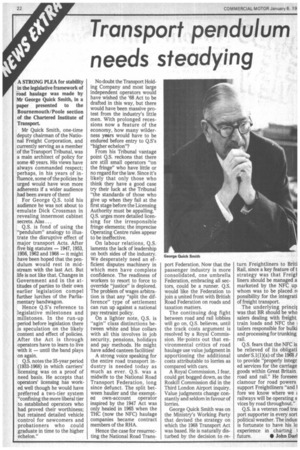Transport pendulum needs steadying
Page 24

If you've noticed an error in this article please click here to report it so we can fix it.
A STRONG PLEA for stability in the legislative framework of Foad haulage was made by Mr George Quick Smith, in a paper presented to the Bournemouth/Poole section of the Chartered Institute of Transport.
Mr Quick Smith, one-time deputy chairman of the National Freight Corporation, and currently serving as a member of the Transport Tribunal, was a main architect of policy for some 40 years. His views have always commanded respect; perhaps, in his years of influence, some of the policies he urged would have won more adherents if a wider audience had been aware of them!
For George Q.S. told his audience he was not about to emulate Dick Crossman in revealing innermost cabinet secrets. Alas ...
Q.S. is fond of using the "pendulum" analogy to illustrate the disruptive effect of major transport Acts. After five big statutes — 1947, 1953, 1956, 1962 and 1968 — it might have been hoped that the pendulum would rest in midstream with the last Act. But life is not like that. Changes in Government and in the attitudes of parties to their own earlier legislation compel further lurches of the Parliamentary bandwagon.
Hence Q.S's reference to legislative milestones and millstones. In the run-up period before legislation there is speculation on the likely content and effect of policies. After the Act is through operators have to learn to live with it — until the band plays on again.
Q.S. notes the 35-year period (1933-1968) in which carriers' licensing was on a proof of need basis. He accepts that operators' licensing has worked well though he would have preferred a two-tier system "confining the more liberal tier to established operators who had proved their worthiness; but retained detailed vehicle control for newcomers and probationers who could graduate in time to the higher echelon." No doubt the Transport Holding Company and most large independent operators would have wished the '68 Act to be drafted in this way, but there would have been massive protest from the industry's little men. With prolonged recessions now a feature of the economy, how many wilderness years would have to be endured before entry to Q.S's "higher echelon"?
From his Tribunal vantage point Q.S. reckons that there are still small operators "on the fringe" who have little or no regard for the law. Since it's likely that only those who think they have a good case try their luck at the Tribunal "the standards of those who give up when they fail at the first stage before the Licensing Authority must be appalling." Q.S. urges more detailed licensing for the irresponsible fringe elements; the imprecise Operating Centre rules appear to be ineffective.
On labour relations, Q.S. laments the lack of leadership on both sides of the industry. We desperately need an efficient disputes machinery in which men have complete confidence. The readiness of workers to resort to force to override "justice" is deplored.
• The problem of wages arbitration is that any "split the difference" type of settlement can run up against a national pay restraint policy.
On a lighter note, Q,S. is "agin" class distinctions between white and blue collars with all this involves in job security, pensions, holidays and pay methods. He might have added canteen facilities!
A strong voice speaking for the entire road transport industry is needed today as much as ever. Q.S. was a midwife to the National Road Transport Federation, long since defunct. The split between haulier and the exempted own-account operator inspired by the 1947 Act was only healed in 1965 when the THC (now the NFC) haulage companies became contract members of the RHA.
Hence the case for resurrecting the National Road Trans port Federation. Now that the passenger industry is more consolidated, one umbrella Federation, embracing all sectors, could be a runner. Q.S. would like the Federation to join a united front with British Road Federation on roads and taxation matters.
The continuing dog fight between road and rail lobbies will go on, Q.S. believes, until the track costs argument is resolved by a Royal Commission. He' points out that environmental critics of road haulage use value judgment in apportioning the additional costs attributable to lorries as compared with cars.
A Royal Commission, I fear, could get bogged down, as the Roskill Commission did in the Third London Airport inquiry. Value judgments change constantly and seldom in favour of lorries.
George Quick Smith was on the Ministry's Working Party that devised the strategy on which the 1968 Transport Act was based. He is naturally disturbed by the decision to re turn Freightliners to Briti Rail, since a key feature of t strategy was that Freigt liners should be managed a marketed by the NFC up. whom was to be placed n ponsibility for the integrati of freight transport.
The underlying princit was that BR should be who salers dealing with freight train loads and NFC the tailers responsible for build and processing for trunking rail.
Q.S. fears that the NFC is be relieved of its obligati under SA (1)(a) of the 1968 .P to provide "properly integr ed services for the carriage goods within Great Britain road and rail." He foresee: clamour for road powers support Freightliners "and 1 fore we know where we E railways will be operating s vices by road throughout."
Q.S. is a veteran road tral port supporter in every sort political weather. The indusi is fortunate to have his lo experience in charting I future. • John Dar]




















































































